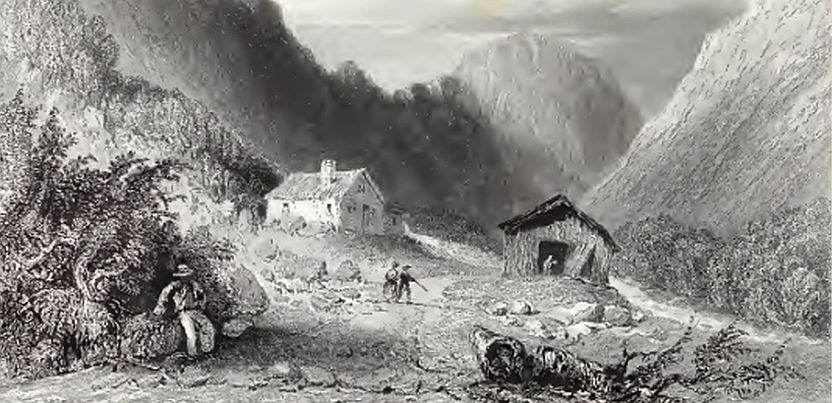 The central theme of this humorous story by John Gardner is to respect the views of one’s elders. A dragon ravages a medieval kingdom with some modern touches (clocks, novels, cars and cigars). When the king’s knights and wizard prove ineffective, he calls a town meeting to ask for ideas, promising his daughter’s hand and half his kingdom to anyone who can slay the dragon. After the two older sons of a wise cobbler ignore their father’s advice and fail, their nervous younger son heeds his words and succeeds. Other themes include social class, honor, and courage (overcoming one’s fears). More…
The central theme of this humorous story by John Gardner is to respect the views of one’s elders. A dragon ravages a medieval kingdom with some modern touches (clocks, novels, cars and cigars). When the king’s knights and wizard prove ineffective, he calls a town meeting to ask for ideas, promising his daughter’s hand and half his kingdom to anyone who can slay the dragon. After the two older sons of a wise cobbler ignore their father’s advice and fail, their nervous younger son heeds his words and succeeds. Other themes include social class, honor, and courage (overcoming one’s fears). More…
All posts by shortsonline
The Duchess and the Jeweller
 This story by Virginia Woolf reflects the period in which the moral decadence of British aristocracy led to its loss of respect among the people and the rising influence of newly rich commoners. It also shows how both groups could be equally ruthless in achieving their goals. The Duchess represents the aristocracy, corruptly trying to sell a fake set of pearls by taking advantage of the Jeweller’s interest in her daughter. The Jeweller represents the newly rich, craving social acceptance and willing to waste £20,000 buying fake pearls to achieve it. Themes include greed, vanity, social class, appearance, deception, racism. More…
This story by Virginia Woolf reflects the period in which the moral decadence of British aristocracy led to its loss of respect among the people and the rising influence of newly rich commoners. It also shows how both groups could be equally ruthless in achieving their goals. The Duchess represents the aristocracy, corruptly trying to sell a fake set of pearls by taking advantage of the Jeweller’s interest in her daughter. The Jeweller represents the newly rich, craving social acceptance and willing to waste £20,000 buying fake pearls to achieve it. Themes include greed, vanity, social class, appearance, deception, racism. More…
The Ambitious Guest
 Based on a true event, this Nathaniel Hawthorne story illustrates the power of nature and the futility of man in trying to best it. A young man stops at an inn high on a mountain pass and boasts to the family inside about his ambition to do something great to be remembered by. Above the inn are towering mountains from which rocks and boulders are frequently dislodged. The family have built a safe house nearby in the event of an avalanche, but when the ‘slide’ comes, nature wins. Other themes include hubris, ambition, contentment, connection, fate. More…
Based on a true event, this Nathaniel Hawthorne story illustrates the power of nature and the futility of man in trying to best it. A young man stops at an inn high on a mountain pass and boasts to the family inside about his ambition to do something great to be remembered by. Above the inn are towering mountains from which rocks and boulders are frequently dislodged. The family have built a safe house nearby in the event of an avalanche, but when the ‘slide’ comes, nature wins. Other themes include hubris, ambition, contentment, connection, fate. More…
Civil Peace
 On the surface, Chinua Achebe’s Civil Peace appears to be a light-hearted take on the challenges faced by a family in the aftermath of the Nigerian Civil War. In reality, it deals with the much darker themes of corruption, devastation and lawlessness, as well as the positive themes of being thankful for what you have, finding opportunity in adversity, hard work, family unity, and the resilience of the human spirit in times of extreme difficulty. Another theme, common in the third-world and reflected in the frequently repeated Nothing puzzels God!, is that everything that happens is part of God’s plan. More…
On the surface, Chinua Achebe’s Civil Peace appears to be a light-hearted take on the challenges faced by a family in the aftermath of the Nigerian Civil War. In reality, it deals with the much darker themes of corruption, devastation and lawlessness, as well as the positive themes of being thankful for what you have, finding opportunity in adversity, hard work, family unity, and the resilience of the human spirit in times of extreme difficulty. Another theme, common in the third-world and reflected in the frequently repeated Nothing puzzels God!, is that everything that happens is part of God’s plan. More…
Look at All Those Roses
 In this story by Elizabeth Bowen, car trouble on a deserted country road results in a woman spending several unsettling hours with an amazon of a woman and her seemingly psychic, paralyzed daughter. Her partner has walked to a nearby village to get help, and she becomes increasingly anxious. She falls asleep, and is in the middle of a disturbing dream when her partner returns in a taxi and rudely whisks her away. While in the village, he had heard a frightening rumor about the family. Themes include isolation and alienation, insecurity, emptiness, alternative reality (the white circle), rumor. More…
In this story by Elizabeth Bowen, car trouble on a deserted country road results in a woman spending several unsettling hours with an amazon of a woman and her seemingly psychic, paralyzed daughter. Her partner has walked to a nearby village to get help, and she becomes increasingly anxious. She falls asleep, and is in the middle of a disturbing dream when her partner returns in a taxi and rudely whisks her away. While in the village, he had heard a frightening rumor about the family. Themes include isolation and alienation, insecurity, emptiness, alternative reality (the white circle), rumor. More…